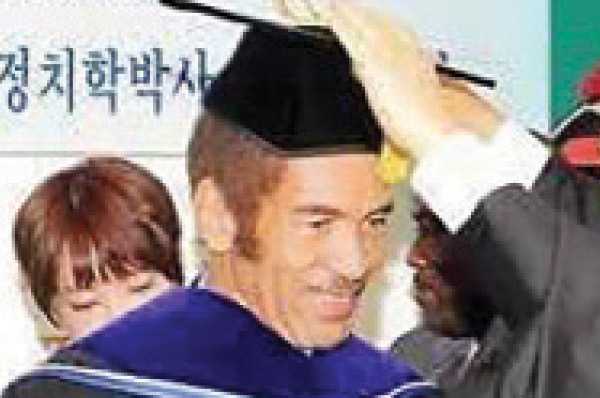Dr Ian Khama; the politics of honorary degrees
At long last President Ian Khama has a degree. It is a doctoral degree by the way. It is needles to state that it is honorary; that is being petty. After all, it could not have been otherwise.
It was conferred to him by one university located somewhere in the Korean Peninsula, apparently for being the voice of “rationality, democracy, human rights and the rule of law.” Although it is very consistent with a healthy mental constitution that such publicity-seeking stunt would make one laugh, just try hard not to laugh. Congratulations are in order Sir! But may I mention without any intended malice, that a Mabijo-like character in the name of Kermit the Frog has also been awarded honorary doctoral degree by Australia’s Long Island University. Just in case you are wondering how devalued and meaningless these ‘honours’ and ‘prizes’ have become, be reminded that President Robert Mugabe has recently been awarded Confucius Peace Prize by a Chinese institution for his “outstanding contribution towards world peace.” Indeed, another man’s terrorist is another man’s freedom fighter.
But besides being trivialised as marketing and publicity tools, honorary degrees and ‘prizes’ are a functionary of international politics and public diplomacy. For foreign policy entrepreneurs, they are legitimate instruments of soft-power that can be employed as and when to achieve a favourable outcome towards a policy objective. Let us face it: the idea that Mugabe, who has mercilessly ruined Zimbabwean economy beyond repair can be considered for a ‘peace prize’ is as ridiculous as honouring President Khama’s human rights record. But in international politics, alliance and ideological affinity are more important than the truth. Mugabe’s award does not come as a surprise as it is consistent with his “Look East” policy. On the other hand, western governments, lobby groups and think tanks have in the past ‘honoured’ various Chinese political ‘dissidents’ for their fight for ‘freedom’ and ‘human rights.’ This is also not surprising as it is consistent with the West’s position on China’s human rights record. The point is, ethically speaking, these honorary degrees and awards counts for nothing, but influence.
Therefore, instead of basking in the adulation of illusory ‘doctoral degree,’ President Khama must figure out the wider implications of this uncharacteristic gesture from the South Koreans. Lest we found ourselves being used as a political pawn in the East-Asian struggle for power and influence between China and South Korea. The question is: what does South Korea seek to achieve in our relationship and how do they intend to frame their interests in the context of our apparent ‘complicated’ relations with China? Do they seek to capitalise on our ‘complicated’ relationship with China and offer alternative ‘quality’ human and industrial capital or they want to cultivate a new relationship devoid of extenuating factors? Whatever the answer, it would be ignorant to assume that the South Koreans are not aware of Botswana government’s dissatisfaction with Chinese companies.
As such, they may seek to exploit that and present themselves as viable and reliable alternative leveraging on their technological and human capital.
At the same time, it would be utterly ignorant to think that the South Koreans do not know that political power in Botswana lies solely with President Khama. They know he is the “Alpha and Omega” for any project that seeks to enjoy political will. Therefore, faced with this reality, they see soft-power as an alternative option to enlarge Korea’s ‘foot-print’ in Botswana and possibly the region. But in order to achieve this, they first have to look for an internationally credible partner, if there is none, they make him by awarding a phony doctoral degree. In other words, these ‘honorary degrees’ and ‘prizes’ are just internationally accepted form of bribery. They generally do not stand for nothing but interests.
[email protected]






